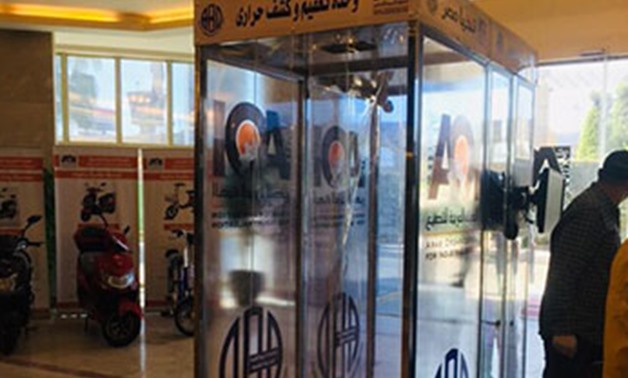
The disinfection cabin, made by the Arab Organization for Industrialization, has a thermometer device in the first stage and disinfectant sprayers in the second phase - Egypt Today
CAIRO – 30 April 2020: An Egypt-based military organization has manufactured a disinfection cabin inside its factories and made it ready for use, as the Egyptian state is planning to take steps to open up economy and prepare for coexistence with the novel coronavirus (COVID-19).
The disinfection cabin, made by the Arab Organization for Industrialization, has a thermometer device in the first stage and disinfectant sprayers in the second phase.
Higher Education Minister Khaled Abdel Ghaffar appeared in a video while preparing to try the cabin.



On Wednesday, Egypt’s National Endowment (Awqaf) Investments Group started manufacturing the first sterilization booth to be used in the sterilization of mosques and bodies under the guidance of Minister of Awqaf Mohamed Mokhtar Gomaa.
The Ministry of Endowments announced the launch of the first line for the production of mosque sterilization booths, with an estimated capacity of 100 units per month.
Gomaa also instructed the National Endowment Investments Group to manufacture the sterilization booths in a timely manner to be ready for use upon opening the mosques.
The National Endowment Investments Group had launched a production line for the manufacture of a high-quality protective face mask with a production capacity of 1,500 masks per day, which started to be available for the public at the sales outlets.
CAIRO - 29 April 2020: 226 people in Egypt tested positive for the novel coronavirus (COVID-19) recently and 21 people died, the Health Ministry said on Wednesday, shortly after it noted that 25% of the announced fatalities died before reaching quarantine hospitals as they arrived at hospitals too late.
Health Minister Hala Zayed reviewed the ministry’s plan to fulfill the state’s strategy based on coexistence with the novel virus in the coming period, as the end of the crisis is not yet in sight.
In a meeting with Prime Minister Mustafa Madbouli via video conferencing, the minister noted that the plan is based on following all necessary in various facilities and reassessing the epidemiological situation every 14 days. She affirmed the need for state institutions to set immediate penalties for violators of these measures.
Companies, malls, markets and transportation means will be included in the plan, Zayed said, while affirming that some places that pose a high risk of infection must remain closed. Services in these places should be reached via electronic ways as much as possible, she added.
The minister also referred to some additional public safety procedures in case institutions were opened, including checking the temperature of those entering them, allocating a room inside each institution to isolate any coronavirus suspected cases.
The plan also recommends reducing workers per shift, keeping institutions well-ventilated and reducing the use of air-conditioners whenever possible.
Concerning the current situation, especially amid the increasing number of fatalities in the northeastern African country, Zayed said 25% of the announced coronavirus deaths died before reaching quarantine hospitals, as they arrived at hospitals too late.
She said there are currently 17 quarantine hospitals nationwide housing 3,214 beds, 525 intensive care beds and 413 ventilators.


Comments
Leave a Comment